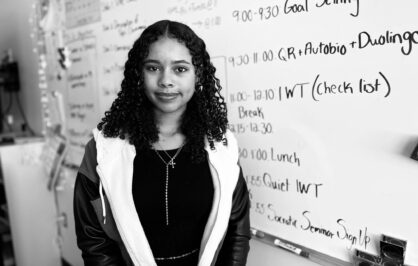
Grants & Scholarships
The barriers are big. The dreams are bigger.
On a recent Saturday morning, ten young Black and Latino men are seated around a table on the second floor of the Mercantile Block in downtown Providence. Lamont Gordon, the executive director of College Visions (CV), stands beside a whiteboard filling it with numbers and statistics.
COLLEGE ENROLLMENT: BM* 31%, LM* 30%
UNEMPLOYMENT: W 4.7%, L 6.8%, B 8.2%
PRISON: WM* 1 in 23, LM 1 in 6, BM1 in 4
WHITES HAVE 10× THE WEALTH OF BLACKS AND LATINOS
*BM: Black male, LM: Latino male, WM: White male
This is a monthly meeting of the Black and Brown Male Scholar Fellowship (The Fellowship), funded by the Rhode Island Foundation, just one small part of the now 20-year-old College Visions, the first and oldest community-based college completion program in the state.
The Fellowship is designed to increase college enrollment and completion for young men of color. Ten 11th-grade students are participating in this two-year college readiness program. Year One focuses on the Black and Brown male experience in society and education, on community-building, and acquisition of academic skills.

Year Two will pivot to college exploration and the application process.
Simon Moore founded College Visions in 2004. A Providence public school student, Moore went on to graduate from Brown University. He took on the need for more holistic college access for low-income, underserved students, collaborating with AS220. Several months later, Simon had a desk in their Empire Street space from which he recruited 10 students.
Twenty years later, College Visions is celebrating 500 college graduates, each of whom has been helped with all aspects of their college applications, including identifying schools that meet their needs and abilities and that offer ample financial aid.
The Rhode Island Foundation has been a committed funding partner to CV throughout the years. Since 2010 we’ve made Foundation directed grants of nearly half a million dollars, and generous donor advisors have contributed another $1.2 million.
Mindy and George Matouk, Creative Director and CEO of luxury linens maker Matouk, co-funded a Foundation grant to College Visions in 2021, and have continued to support the organization through their donor advised fund. Moira Hinderer, CV’s director of development and external relations, notes that the Matouks have been generous with their time and other resources: they recently presented each of CV’s graduating 12th-graders with a bag of linens that included x-long twin sheets (for college dorm mattresses) and towels to get them started as freshmen living independently.
In 2013, the pair established the Matouk Family Fund at the Foundation, where they focus philanthropy on organizations active in the Providence community. “The combination of the state takeover of the Providence Public School District with pandemic-related learning challenges motivated us to approach the Foundation and ask for ways we might be able to help,” said George, who currently serves on the PPSD School Board. “Prior to that conversation, we had never heard of College Visions, but we immediately responded to the mission, and we recognized an opportunity to help CV increase its impact.”
“College Visions serves a wide academic range,” says Moira Hinderer. “Students who are stellar as well as students who have struggled and now want to make this work despite rough spots inthe transcripts.”
The majority are solid academically. CV does not cherry-pick—foundational to their work is the premise that any student who wants to go to college should be supported in that process. “There is an interview process, but it is not based on GPA. Rather on ‘why do you want to be in this program’ and ‘are you committed to it,’ adds Moira.
A great deal of time is spent exploring scholarships, working with parents to make sure they understand the process. College Visions needs to know if taking on debt will be manageable for the family. In addition, CV believes that every student should have at least one low-cost option.
They borrow a van to visit local and regional schools; college representatives also hold information sessions at CV. An arrangement with Southwest Airlines provides CV with vouchers if students need to fly to a school. In fact, Lamont and his ten Black and Latino scholars will be traveling to Baltimore/Washington, DC in April to participate in an NPEA (National Partnership for Educational Access) annual conference and visit area colleges.
“Our model is not transactional—it’s relational, and that makes us unique,” says the current Executive Director Lamont Gordon, who came to Providence with experience in college-access programs in New York City and Boston. “If we have built a relationship, students and their families will see us as a trusted resource.”
CV’s college advisors, with whom the students meet weekly one-on-one, work hard to make the students feel comfortable. Advisors are all ‘first gen’ themselves, so their background and experience help them build a level of comfort and trust.
College Visions serves a wide academic range. Students who are stellar as well as students who have struggled and now want to make this work despite rough spots in the transcripts.
- Moira Hinderer, director of development and external relations
“For instance,” says Lamont, “CV might have a student who finds out only while applying to college that they are undocumented.” You cannot receive federal aid if you are undocumented, so CV must ask the question, and they have to know the answer—a moment where trust is critical. “It is important for us to have the confidence that we can support a student upon that revelation.”

Most of their students will qualify for the maximum Pell grant. “At one time, a Pell grant could cover 80% of tuition, now it’s more like 30%.” It has enabled millions of young people to go to college, but Lamont would like to see the Pell grant increased as it has not kept up with the rising cost of college.
“Typically, it is not just tuition that is the problem—it’s also transportation, housing, food,” continues Lamont. “All college aid initiatives should take these costs into account in order to make college truly affordable.”
CV has created an emergency fund to help students with unexpected expenses, and they do have students who are managing to navigate problems like these with their support. Lamont notes that many CV students choose professions in which they can give back to their communities in some way. “We focus on college graduation and, while the college degree is our primary metric, it is not the end of the story—rather the beginning. Our long-term vision is that CV students will graduate from college, build careers, and become leaders who help lift up our community.

“I chose this line of work for that reason. I am a first-gen college graduate. My dad was a taxi driver. From first to eighth grade, I went to seven different schools in DC because we moved constantly. The rent would be due and we would have to move. In middle school, I participated in a program called Higher Achievement, an academic enrichment program that provided an opportunity for kids like me, a program like College Visions.”
Knowing that they operate in an unjust system, College Visions focuses on what is in their control. “We are trying to be a resource for young people who are at a disadvantage because of these disparities—many of our students are written off by others, confronted with low expectations that assume they are not college material. With the right support, we can help students get into and succeed in college.
“I have always had faith and hope that things can get better. That is what keeps me going. I want my Black and Latino group to know that we face systemic challenges, but I do not want to send them home thinking ‘what is the point of going to college.’ We want them to use this knowledge as a motivator to achieve their goals and eventually become part of the solution to these systemic challenges.”
On that Saturday morning, every one of those Black and Brown high school juniors left that room with a renewed belief in their own sense of promise and responsibility—with a sense of hope.

College Visions: Jaimy Deburgo
Now in her second year as a nursing student at the University of Rhode Island, Jaimy Deburgo has settled into college life. Jaimy attributes her solid adjustment in part to her experience with College Visions and still calls on her advisor for support.
While a senior at East Providence High School, Jaimy was encouraged by her English teacher to apply for the CV program. “My friends and I were not excited about it—just another obligation in the process of thinking about college. But I applied, was accepted, went to a general meeting followed by a summer event—and I was sold.”
Jaimy says the most important outcome of her participation was the support and the community it provides. “My advisor was great—she walked me through so many complicated forms and applications when I was really stressed—whether questions about scholarships or financial aid, I always felt ‘I am not alone in this.’” An updated list of scholarships is available, and advisors work with students one-on-one to help them develop polished application materials.
Since starting college, Jaimy has also been able to draw on CV’s emergency fund, which has been in place since 2009. “We distribute about $15,000 each year to students for expenses such as textbooks and codes, course materials, eyeglasses, transportation, housing deposits, and other expenses,” says Moira Hinderer, CV’s director of development. “By covering the cost of something like a textbook, we can ensure that a student isn’t trying to get by borrowing course materials and underperforming in the class.” (During 2020,CV distributed $60,000 to students, which helped them buy technology for online classes and pay for housing, utilities, and food when campuses closed and students lost employment.)
When asked, ‘What would you tell a sibling or friend about College Visions? What wisdom would you impart?’ Jaimy replied:
- Apply for CV. It was so helpful.
- Start looking at scholarships immediately—don’t wait. Even if it means that you have to write a 500-word essay—there’s an interesting story you can tell.
- It’s okay that you don’t know what you want to do. Explore, take a class, and if you like it, take another. The first year, get gen-ed done and explore majors.
This semester, she will be starting her nursing clinicals at Kent Hospital. When asked ‘why nursing?’ Jaimy answers: “My parents are older—in their 60s—and I have already been helping them manage their health needs. Now that I am in the program at URI, I have come to believe that this is a really good choice for me.
“After I graduate, I plan to work at a hospital for a couple of years. Med-surg gives you experience on each floor, and after six months, you probably know what you want to focus on. Then I will get my NP—after working three years, most hospitals will pay for continued education.
“Ultimately, I would like to work in a small clinic near my house in East Providence.”



